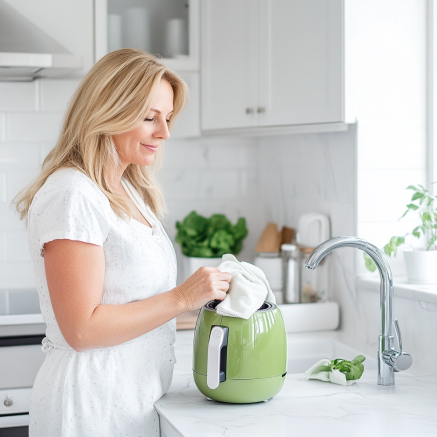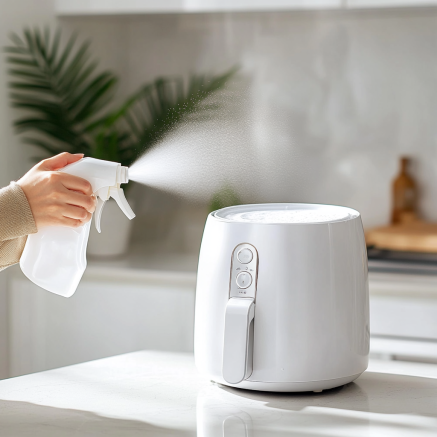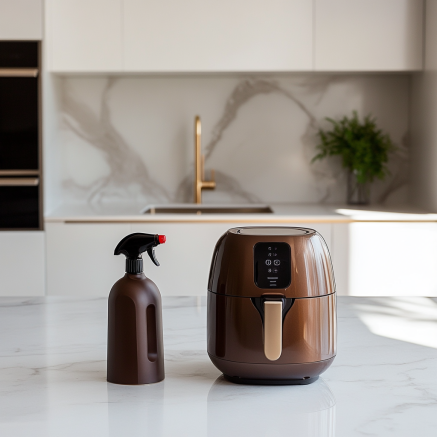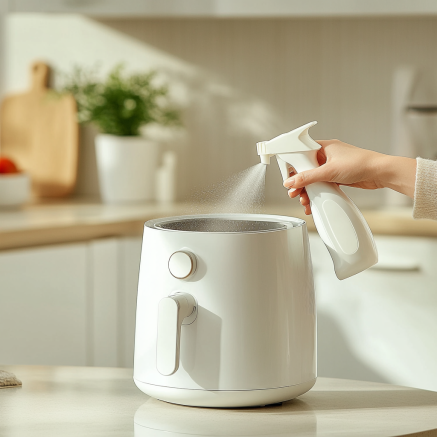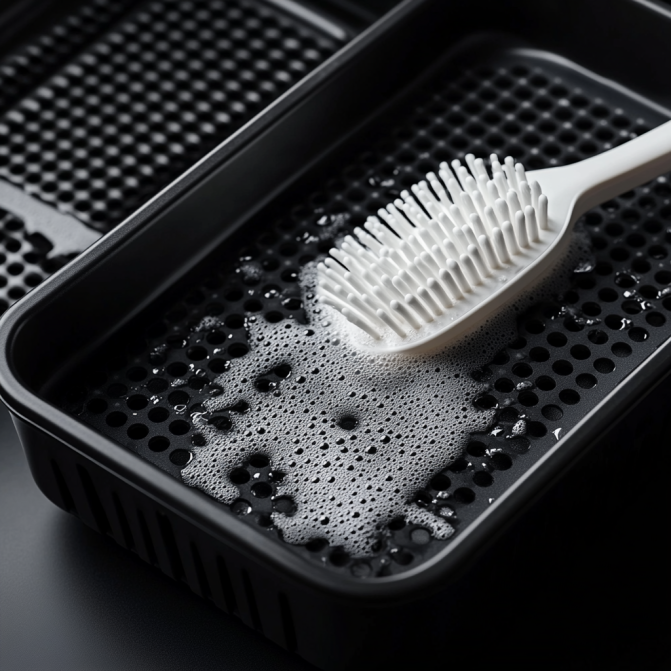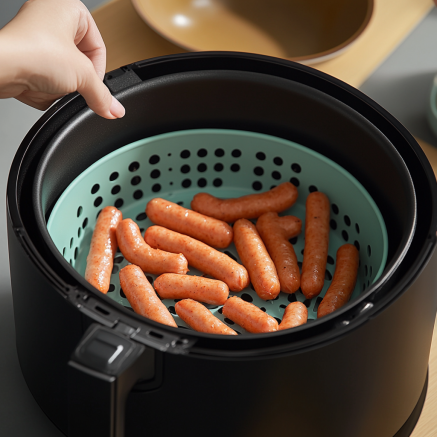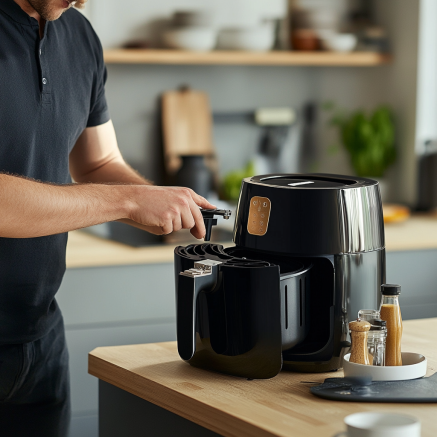How To Descale Air Fryer Water Deposits: Quick Guide
Air fryers have become a staple in many kitchens, offering a healthier alternative to traditional frying. Like any appliance, they require regular maintenance to function well. One common issue is the buildup of water deposits, which can affect performance and flavour.
Understanding the causes of these deposits is important, as is knowing how to effectively descale your air fryer. This article explores the importance of descaling, methods to do so, preventative measures, and common mistakes to avoid, ensuring your air fryer stays in top shape.
Understanding Air Fryer Water Deposits
Air fryers have gained significant popularity as kitchen appliances that provide health-conscious cooking alternatives. However, over time, they may develop water deposits due to mineral buildup from hard water.
Understanding the causes of these deposits is essential for maintaining both the efficiency and lifespan of the appliance. Failing to clean the air fryer regularly can result in the accumulation of undesirable residue, which can negatively impact both performance and hygiene.
Consequently, it is imperative to recognise the signs of water deposits to ensure effective appliance care, thereby allowing the air fryer to function optimally for an extended period.
What Causes Water Deposits?
Water deposits in air fryers are primarily attributed to hard water, which contains elevated levels of minerals that can lead to limescale build-up over time. This accumulation of minerals may create residue on the surfaces of the air fryer, thereby impeding its efficiency and overall performance. Understanding the specific causes of water deposits is crucial for effective cleaning and maintenance, ensuring that the appliance remains in optimal condition and safe for use.
YETI Rambler 20 oz Stainless Steel Vacuum Insulated Tumbler w/MagSlider Lid
$35.00 (as of 21:24 GMT +00:00 - More info)Owala FreeSip Insulated Stainless Steel Water Bottle with Straw for Sports and Travel, BPA-Free, 24-oz, Blue/Teal (Denim)
$27.99 (as of 21:24 GMT +00:00 - More info)Hard water typically contains minerals such as calcium and magnesium, both of which contribute to the formation of limescale. Over time, these deposits can diminish the effectiveness of the heating element, resulting in uneven cooking and increased energy consumption.
Consequently, the quality of water used in an air fryer can significantly impact its longevity and performance. To mitigate the formation of mineral deposits, employing cleaning solutions such as vinegar and citric acid can prove to be highly effective.
These natural agents facilitate the dissolution of limescale, making it easier to maintain the appliance in peak condition, thereby extending its useful life.
The Importance of Descaling
Descaling your air fryer is an essential maintenance procedure that can considerably improve both the longevity and performance of the appliance.
Regular descaling helps to prevent mineral build-up, which may result in cooking inefficiencies, unpleasant odours, and potential health risks due to compromised hygiene within the appliance.
By implementing effective descaling practices, one can enhance the appliance’s efficiency, ensuring that food is cooked safely and evenly, thereby contributing to an overall improved user experience.
Benefits of Regular Descaling
Regular descaling provides numerous advantages for air fryers, including enhanced efficiency and improved cooking performance. By removing limescale and mineral buildup, the risk of unpleasant odours is minimised, and food particles or residue are less likely to interfere with cooking results.
This proactive maintenance not only extends the appliance’s lifespan but also enriches the overall cooking experience, making it an essential component of air fryer care.
Along with these benefits, routine cleaning and preventative measures significantly enhance energy efficiency, allowing the appliance to operate at peak performance while consuming less power. A well-maintained air fryer can also eradicate stubborn odours, ensuring that each meal retains a fresh taste without the influence of lingering flavours from previous dishes.
Proper care and cleaning protocols further promote food safety by reducing bacterial growth, thereby providing peace of mind with every meal prepared. By prioritising descaling and regular maintenance, owners can enjoy delicious, safe, and flavourful meals while ensuring the longevity of their valued kitchen appliance.
Methods for Descaling Air Fryers
There are several methods for descaling air fryers, each providing effective solutions to eliminate mineral build-up and ensure appliance hygiene. Employing eco-friendly cleaning agents such as vinegar, bicarbonate of soda, or citric acid offers a cost-effective and non-toxic approach to comprehensive cleaning.
Adhering to the specific instructions detailed in the user manual will ensure the implementation of the most appropriate method for the appliance, thereby preserving its non-stick coating and overall performance.
Step-by-Step Instructions for Different Methods
To effectively descale your air fryer, adhere to the following step-by-step instructions tailored for various cleaning methods that utilise safe materials, such as vinegar and bicarbonate of soda. Begin by preparing your chosen cleaning solution, then proceed to soak and scrub the affected surfaces to ensure comprehensive cleaning. Rinse the appliance thoroughly with hot water to eliminate any residual cleaning agents, thus promoting optimal hygiene.
Maintaining the cleanliness of your air fryer is essential not only for its performance but also for its longevity. It is advisable to clean the appliance after every few uses, depending on the frequency of fried dish preparation.
For regular maintenance, consider establishing a cleaning schedule that includes a deep clean once a month. Along with vinegar, bicarbonate of soda can serve as a gentle yet effective abrasive for removing stubborn residue.
It is crucial to avoid harsh chemicals that may damage the internal components of the appliance. Instead, utilise soft sponges or cloths during the scrubbing process to ensure that your air fryer remains in excellent condition while prioritising safety.
Preventative Measures to Avoid Water Deposits
Implementing preventative measures can substantially decrease the likelihood of water deposits accumulating in an air fryer, thereby enhancing appliance performance and extending its lifespan.
By establishing consistent cleaning routines and utilising soft water whenever feasible, users can effectively minimise the buildup of mineral deposits, ensuring that their air fryer remains in optimal condition for all cooking endeavours.
Tips for Keeping Your Air Fryer Clean
To ensure the cleanliness of your air fryer, it is essential to implement key cleaning strategies that facilitate effective residue removal and enhance the hygiene of the appliance. Regularly cleaning the basket, utilising non-abrasive tools, and adhering to a consistent maintenance schedule can prevent the accumulation of food particles and odours, thereby ensuring that your air fryer remains safe and efficient for daily use.
Establishing a regular cleaning routine—ideally after each use or at least once a week—will help guarantee that the appliance continues to perform optimally. It is important to wipe down both the exterior and interior components to eliminate grease splatters that may accumulate over time. Utilising natural cleaning agents such as vinegar or bicarbonate of soda can provide an effective solution for tackling stubborn stains without risking damage to the appliance.
Fostering these cleaning habits not only maintains the aesthetic appeal of the air fryer but also extends its lifespan, making it a dependable kitchen tool for preparing your favourite meals.
Common Mistakes to Avoid When Descaling
Avoiding common mistakes when descaling an air fryer is crucial to prevent potential damage to the appliance and to ensure effective cleaning. Many users often overlook important guidelines specified in the user manual, such as the use of abrasive materials or the necessity of thoroughly rinsing after the application of strong cleaning solutions.
Awareness of these pitfalls is essential for maintaining the appliance’s performance and longevity, ultimately helping to avoid costly repairs.
How to Avoid Damaging Your Air Fryer
To prevent damage to the air fryer during the cleaning process, it is essential to utilise safe materials and methods that safeguard the appliance’s non-stick coating and overall integrity. This entails selecting non-abrasive scrubbing tools and ensuring a thorough rinsing of the appliance after the use of cleaning solutions to remove any residues.
When cleaning, it is advisable to employ soft cloths or sponges and to avoid harsh materials that could scratch the surface. For stubborn food particles, a gentle dish soap diluted in warm water is effective without compromising the coating. After scrubbing, it is imperative to completely rinse the basket and tray to eliminate any residual soap, as this can adversely affect the flavour of future meals.
It is also critical to ensure that all components are completely dry before reassembling the appliance. Residual moisture can lead to rusting and diminished performance over time. By adhering to these best practices, users can effectively maintain their appliance in optimal condition.
